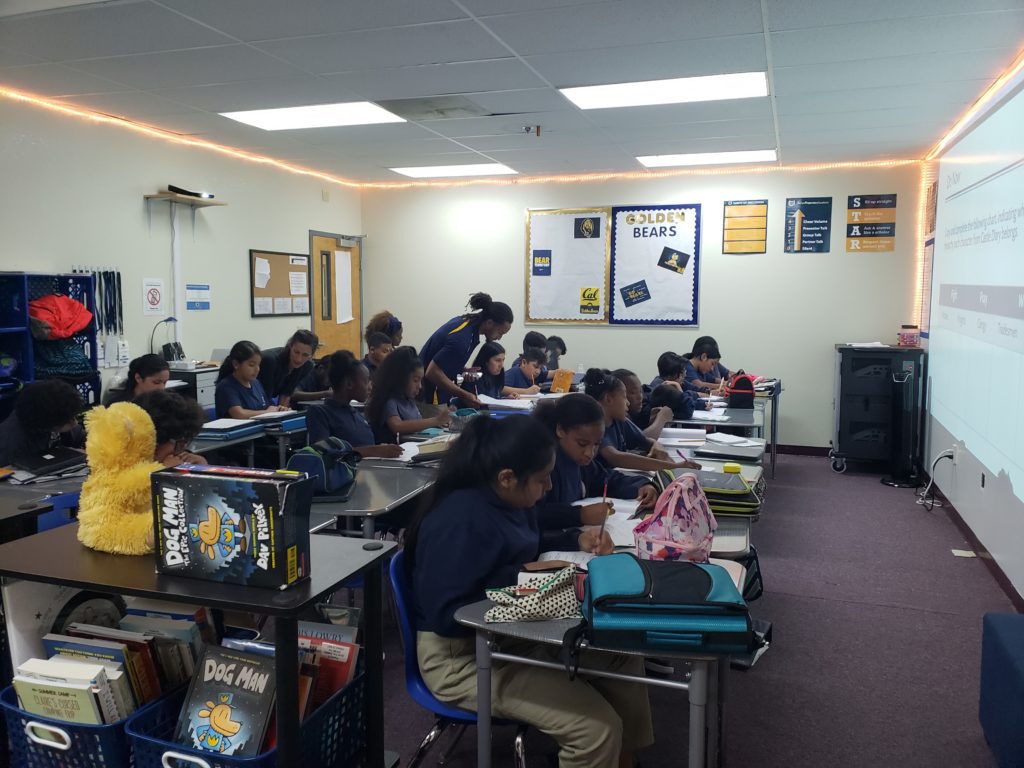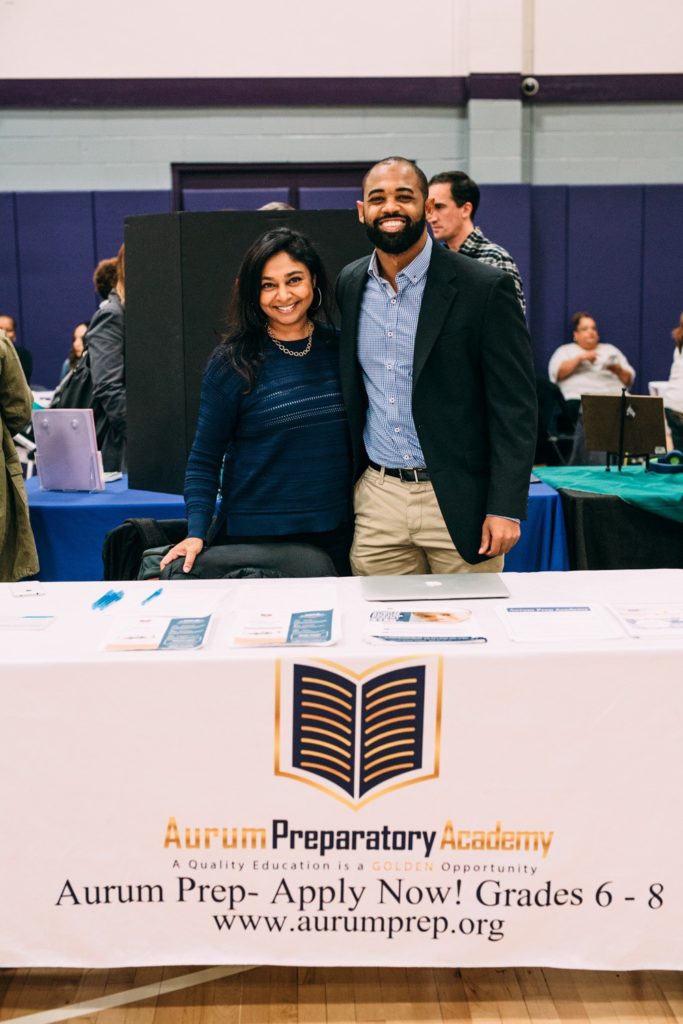A Guest post from Families in Action, please follow their blog for more great content.
As he moves around his 7th grade math classroom, Aurum Preparatory Academy (“Aurum Prep”) teacher, Salif Doubare, is crackling with energy. He’s tall, thin, wearing horn-rimmed glasses and a big smile, as he walks around a large table in the center of the classroom, encouraging students. When it comes to his class, he wants to meet students where they’re at.
“They can sit wherever they want, express themselves however they want,” Doubare says, “but their math has to be impeccable.” His favorite moments come when a student gets it, when the lightbulb goes on. They understand how much math is a part of their daily lives and how much they already know. “It’s like the discovery of fire,” he says.
75% African American Male Teachers; When Staff Reflect Students
Doubare is something of a rarity in America, though not at Aurum Prep: He’s a male, African American teacher.
Did you know that only 2 percent of teachers are black men? At many schools, black educators are used to being “the one.” At Aurum Prep in East Oakland, they’re one of many. In America, 80 percent of teachers are white. At Aurum Prep, now in its second school year, 75 percent of the teachers are African American men.
Studies show all students greatly benefit from having a black, male teacher. A black male student who has just one or two black male teachers is significantly more likely to go to college and significantly less likely to drop out.
The Aurum Prep student body is 55 percent Latinx and 45 percent African American. “Our staff represents, not only ethnically but in terms of background and life experience, our student body,” says Swati Samanth, Aurum’s Director of Operations. “Just by their very being, they inspire students.”

Breaking the Achievement Gap, with Support and Personal Connections
The results so far are promising. When the school opened, students arrived on average 3 years behind grade level. In that first year, they grew by 1.5 years, according to results from the MAP test. The goal this year is to improve the average to 2 years of growth. “If we can do that year after year, we won’t just close the achievement gap,” says David Hardin, Aurum’s Founder and Executive Director. “We will accelerate our students so they’ll be ahead.”
Samanth says parents appreciate the small class sizes at Aurum (25 students at most, with those classes using the “push-in” model where one teacher supports another in the classroom). “Families can see there is a more personal connection here,” she says.
The personal connection is by design. Hardin was a fellow with Building Excellent Schools and the Educate 78 School Design Lab, which he says, “helped me do a lot of thinking about personalization and how that would help our students.” “That’s really where you see growth,” Hardin says about personalized learning. “In order to make growth, and that’s what we’re really focused on, you have to look at it at the individual level.”
On a survey the school administered for parents, more than 90 percent reported they felt welcome and a part of the Aurum Prep community. “Families really appreciated that across the board, teachers and administrators built relationships with them,” Samanth says. “We really do believe it’s the Aurum Prep family, and not just a school.”
The educators also have close relationships with one another, English teacher Justin Franklin says. “From a teacher’s perspective, just the culture of our team, they’re the best people I’ve ever worked with,” he says. “We’re friends, we have the same mission and purpose: high-achieving and sold out for kids. It’s a very supportive environment.”
Science teacher, Brandon Tobler, is from Atlanta. He says he was really drawn to the school because of the family and community feel. “Everyone knows everyone very well,” Tobler says. “It makes it that much more enjoyable to work here. Being able to establish close relationships with not only staff, but students. With the small setting, you’re really able to build deeper relationships with students.”

“Getting a Head Start” Student Perspectives
Na’Ryah is one of Tobler’s 7th grade students, and she loves Science. “The way tiny particles make up everything,” she says, “just blows my mind.” She said her class has completed 6th and 7th grade material and they’re now working on “8th grade stuff.” “It’s a boost and gives us a head start so we’re prepared for college,” she says, “and what comes next.”
Pablo, also a 7th grade student at Aurum, is interested in history. “I like learning about my ancestors,” he says, “and what they did for us to get our freedom.” Pablo says his favorite thing about his school is the teachers. “The teachers here are so much better,” he says. “At some schools, they don’t explain it fully. Here, the teachers explain the subject and you get all the details that are important.”
When Hardin was hiring staff, his goal wasn’t for the school to have an all-male, 7th grade, black teaching force. “I set out with the mission to find the best people for these kids,” he says. “It wasn’t until the summer when Swati (Samanth) and I were talking and putting together the whole team, and she says, ‘You know the entire 7th grade team is black men?’”
“And I was like, ‘Wow, that’s true,’” Hardin continues, breaking into a laugh. “I was just looking for the best people and this is who we found.”
This sort of thing doesn’t just magically happen, though: a school leader doesn’t just look up and notice the racial makeup of the school’s staff is a certain way. There’s a lot of intentionality that goes into it.
“Getting the Best People to do the Job”
“I went back and looked through the candidate pool, and these were the best people for the job,” Hardin says. “So what is it that is attracting these people here?”
It’s an important question, and for Aurum, one that gets to the heart of why this new school,serving black and brown East Oakland kids, is doing so at a high level. It gets back to that intentionality, and what Hardin calls a “virtuous cycle.”
“When teachers come in and they see a student body and other staff that reflect the community, and they see what our culture is, it really attracts them to want to come here and work as well,” he says. “It becomes a virtuous cycle.”
We would honor the life and contributions of Rachel Willis Henry, who passed away this week. She was a founding parent, key contributor, inspiration and friend to the founding team. Aurum Preparatory Academy would not be the school it is today without her sacrifices.
Photos by Ryan Cosens

